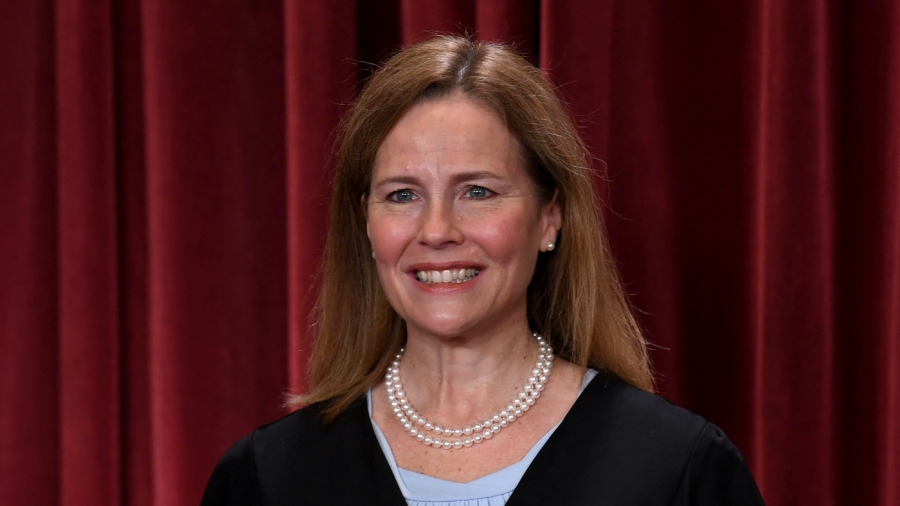Associate Justice Amy Coney Barrett stood alone on March 4 when the Supreme Court unanimously overturned a state court ruling that blocked former President Donald Trump from Colorado’s ballot.
She agreed with the three Democratic-appointed justices that the majority opinion went too far, but she also criticized those liberal justices for “stridency” in their concurrences.
All nine justices agreed to toss the Colorado Supreme Court’s ruling, which had interpreted the 14th Amendment’s “insurrection clause” as applying to former President Trump’s conduct on Jan. 6, 2021.
A 5-4 majority also found that no states can disqualify a federal officer, namely the president, under the Constitution’s Section 3. Written right after the Civil War, it bars a candidate from running if they have engaged in an “insurrection or rebellion” against the U.S. government.
The majority consisted of Chief Justice John Roberts along with Associate Justices Clarence Thomas, Samuel Alito, Neil Gorsuch, and Brett Kavanaugh.
“We conclude that States may disqualify persons holding or attempting to hold state office. But States have no power under the Constitution to enforce Section 3 with respect to federal offices, especially the Presidency,” the five justices wrote.
“Nothing in the Constitution delegates to the States any power to enforce Section 3 against federal officeholders and candidates.”
The four female Supreme Court justices declined to accept that argument issued by the majority and offered two separate dissents.
The three Democrat-appointed justices—Elena Kagan, Sonia Sotomayor, and Ketanji Brown Jackson—wrote that the majority went too far, while Justice Barrett, a Trump appointee, agreed but appeared to suggest that the minority dissenting justices’ rhetoric was inflammatory.
The dissenters said the ruling “shuts the door on other potential means of federal enforcement” and that “we cannot join an opinion that decides momentous and difficult issues unnecessarily.”
They added, “Although we agree that Colorado cannot enforce Section 3, we protest the majority’s effort to use this case to define the limits of federal enforcement of that provision.”
Justice Barrett said that such statements may darken the 9-0 ruling on President Trump’s ballot access.
“The majority’s choice of a different path leaves the remaining justices with a choice of how to respond,” she said.
“In my judgment, this is not the time to amplify disagreement with stridency,” she said, adding that “particularly in this circumstance, writings on the Court should turn the national temperature down, not up.”
In concurrence with the dissenting justices, Justice Barrett wrote that the Trump case does not require the Court to decide on “the complicated question whether federal legislation is the exclusive vehicle through which Section 3 can be enforced,” referring to the insurrection clause.
She also issued a warning. “For present purposes, our differences are far less important than our unanimity: All nine Justices agree on the outcome of this case. That is the message Americans should take home,” she wrote, referring to the dissenting minority.
More Disagreement ‘Than Is Desirable’
“There’s definitely disagreement as to the reasoning behind the results,” Ohio State University election law expert Edward Foley told Reuters. “The conclusion is there’s more disagreement at the court than is desirable in a case involving the presidential election.”
George Mason University constitutional law professor Ilya Somin said the ruling probably will not change any opinions among Americans.
“People who think that Jan. 6 was an insurrection and that Trump was responsible … this ruling certainly won’t change their mind about that,” he told Reuters, adding, “And people who think the opposite, they will continue to think that as well.”
While the high court wants to send a message that they are unified in the Trump ruling, he said, “On the other hand, there are these four justices who seem to have fairly significant reservations about at least some key aspects of the majority’s ruling.”
The opinion came a day before Super Tuesday, the biggest election day aside from Election Day itself in November. Fifteen states and one U.S. territory will vote in primary elections and caucuses, with hundreds of delegates up for grabs.
Two states that were impacted by Trump ballot bans—Colorado and Maine—are among those voting.
Based on recent polls and primary wins in all other states, President Trump is poised to see a major victory.
The only major GOP competitor left, Nikki Haley, has a fraction of the delegates that the former president has, and her only primary win so far came in Washington, D.C.
Reuters contributed to this report.
From The Epoch Times


